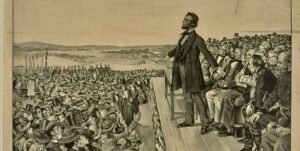
Lincoln on the Nature of the War
The release of Spielberg’s epic movie Lincoln brings up an intriguing question. Was Lincoln as adamantly dedicated to the emancipation of slaves as the movie suggests? After all, there are countless websites, media outlets, and historians that claim Lincoln only desired emancipation, not for humanitarian purposes, not for the sake of those enslaved nor for the sake of egalitarianism, but only as a means to end the Civil War. Others, like this Time magazine book review, have raised the question of whether Lincoln was an outright racist!
When teaching the history of the Civil War, especially in light of Lincoln hitting the theaters recently, these questions pertaining to Lincoln’s devotion to the cause of abolition are highly pertinent. An effective way for teachers to delve into the question of the Lincoln’s publicly-stated views on the nature of the war is to have students read the actual words of the man himself.
The Teaching American History website is a treasure trove of historical documents from the American past. Doing a simple search within this site for a letter Lincoln wrote in August 1862 to New York editor Horace Greeley can start learners down the path of answering these questions for themselves.
Note: it is highly important that students understand the historical context of this letter. It would seem on the surface to imply that Lincoln’s sole purpose in waging the war was to preserve the Union. Certainly that was his publicly-stated goal up to August 1862. However, note that the preliminary Emancipation Proclamation was written about one month later. Lincoln had been waiting for a good news from the battlefield to release such a statement (the near-draw at Antietam had to suffice, won in late September 1862).
Looking at these two documents, students may bring up the point that it does not seem that Lincoln was publicly professing full commitment to black equality. The nature of the war, they may say in so many words, was only to preserve the Union, and any talk of emancipation seemed to be only geared toward that end. They may have a point. Leave them with that thought at the end of your time in class with them. Tune in to the next installment on this blog for further food-for-thought.
For more resources, check out our CDC volume, Abraham Lincoln, available in our bookstore.


